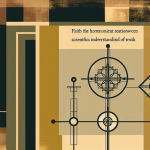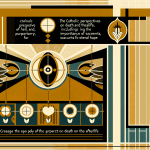Catholic Teachings on Forgiveness
Forgiveness is a vital component of the Christian faith, particularly within Catholic teachings. It’s a divine concept that transcends human understanding, encouraging believers to extend grace and mercy, reflecting God’s unconditional love. In this blog post, we will explore the core teachings of the Catholic Church on forgiveness, its significance, and practical ways to embody this profound virtue in daily life.
The Importance of Forgiveness in Catholicism
Forgiveness is central to Catholic teachings, rooted in scripture and tradition. The Bible is replete with examples emphasizing the importance of forgiving others. In the Gospel of Matthew, Jesus teaches, “For if you forgive other people when they sin against you, your heavenly Father will also forgive you” (Matthew 6:14, NIV). This verse illustrates the reciprocal nature of forgiveness—our ability to forgive others is directly linked to God’s forgiveness of our sins.
In Catholic doctrine, forgiveness is not merely an act; it is a profound transformation of the heart. It aligns believers more closely with the will of God, encouraging them to emulate Christ’s own capacity for mercy. The Catechism of the Catholic Church states, “Forgiveness is a pivotal point of the Christian life” (CCC 2844), signifying its importance in journeying towards holiness.
The Biblical Foundations of Forgiveness
Catholic teachings on forgiveness stem from both the Old and New Testaments. In the Old Testament, scriptures emphasize the call for justice and mercy. The concept of “forgiving” is also echoed in the teachings of prophets such as Isaiah and Micah, who stressed the importance of compassion and reconciliation.
In the New Testament, Jesus’s parables highlight the significance of forgiveness. The Parable of the Unforgiving Servant (Matthew 18:21-35) serves as a poignant illustration of how rejecting forgiveness can lead to severe consequences. This teaching underscores that those who have received grace from God are called to share that same mercy with others.
Throughout the Gospels, Jesus not only teaches forgiveness but lives it out. He forgives sins directly, as seen in the case of the paralytic (Mark 2:1-12), and even in His final moments on the cross, He utters the words, “Father, forgive them, for they do not know what they are doing” (Luke 23:34, NIV). This radical act of forgiveness illustrates the heart of Catholic teachings on forgiveness—being able to forgive even under the most painful circumstances.
The Sacrament of Reconciliation
One of the pivotal aspects of Catholic forgiveness is the Sacrament of Reconciliation, also known as Confession. This sacrament is a vital means through which Catholics seek forgiveness for their sins and restore their relationship with God. The act of confessing one’s sins to a priest highlights the communal and communal dimensions of reconciliation within the Church.
During Confession, Catholics express sincere contrition and resolve to amend their lives. The priest, acting in the person of Christ, grants absolution, signifying God’s forgiveness bestowed upon the penitent. This sacramental grace reinforces the belief that forgiveness is not just a solitary act but functions within the community of the Church, illustrating God’s mercy toward all.
Through the Sacrament of Reconciliation, the Catholic Church encourages its faithful to regularly seek forgiveness, thus fostering a culture of mercy and reconciliation. It is a reminder that God’s love is readily available for those who humble themselves and seek His pardon.
The Process of Forgiveness in Catholic Teachings
Forgiveness in Catholicism often involves a deliberate process. This journey can be broken down into several steps, reflecting a deep commitment to personal transformation and healing.
1. Acknowledgment of Hurt
The first step in the process of forgiveness involves acknowledging the hurt or offense caused by another. Catholics are encouraged to confront their feelings and understand the impact of the wrong. This recognition is essential for moving forward and opening the heart to forgiveness.
2. Reflection on God’s Mercy
Next, individuals are invited to reflect on the mercy and forgiveness they have received from God. Understanding one’s own need for forgiveness helps in developing empathy and compassion toward those who have hurt us. It reminds believers that they, too, are flawed and in need of grace.
3. Willingness to Forgive
Forgiveness is a conscious choice. Catholics are taught that while feelings may take time to change, the decision to forgive must be made. This willingness does not mean condoning or excusing the offense but rather a commitment to let go of resentment and hate.
4. Setting Boundaries
Forgiveness does not equate to re-establishing relationships without thought. Sometimes, it might be necessary to set boundaries to protect oneself emotionally and spiritually. Catholics are encouraged to forgive while also being wise about relationships.
5. Prayer for the Offender
Prayer is a powerful tool in the forgiveness process. Catholics are urged to pray for those who have wronged them, asking God to bless and heal both parties. This practice can help soften the heart and facilitate the process of forgiveness.
6. Seeking God’s Strength
Through prayer and the sacramental life, Catholics draw on God’s strength to forgive. The Holy Spirit guides believers through their journey of forgiveness, helping them to heal and find peace.
The Fruits of Forgiveness
Forgiveness is not only a spiritual mandate; it also brings forth numerous emotional and physical benefits. Catholic teachings suggest that the practice of forgiving others leads to greater peace, reduced anxiety, and improved relationships. Forgiveness fosters reconciliation and community, strengthening bonds among individuals, families, and congregations.
Furthermore, forgiving others allows for personal liberation. Holding onto grudges can lead to bitterness and resentment, consuming a person’s emotional energy. By choosing to forgive, individuals can experience emotional healing and a renewed sense of joy.
The Call to Forgive: Real-Life Applications
The call to forgive resonates deeply in the lives of Catholics. Here are practical gestures to foster forgiveness in everyday life:
- Daily Examination of Conscience: Regularly reflecting on one’s thoughts, actions, and attitudes can help individuals identify areas needing forgiveness—both for themselves and others.
- Participating in the Sacrament of Reconciliation: Engaging in confession regularly not only promotes personal forgiveness but also reinforces the importance of communal healing.
- Acts of Kindness: Engaging in small acts of kindness toward those who have wronged you can demonstrate a commitment to forgiveness.
- Forgiveness Letters: Writing letters to express feelings and articulate thoughts about forgiveness can be a cathartic process.
- Community Discussions: Engaging in discussions within your parish about forgiveness can build a culture of understanding and empathy.
- Prayer Groups: Forming or joining prayer groups focused on forgiveness can provide support and encouragement in the journey to forgive.
Conclusion
Catholic teachings on forgiveness embody a central theme of compassion and mercy that resonates deeply within the faith. Understanding the importance of forgiveness, as presented in scripture and tradition, is crucial for fostering spiritual growth and communal relationships. By embracing the process of forgiveness, Catholics not only align themselves with God’s will but also experience profound personal transformations.
Through the sacramental life and daily practices focused on forgiveness, Catholics can embody the love of Christ in their interactions with others, paving the way for a more compassionate and healing world. Ultimately, forgiveness is a gift—both for the one giving it and the one receiving it, nurturing the spirit of love that lies at the heart of the Catholic faith.




